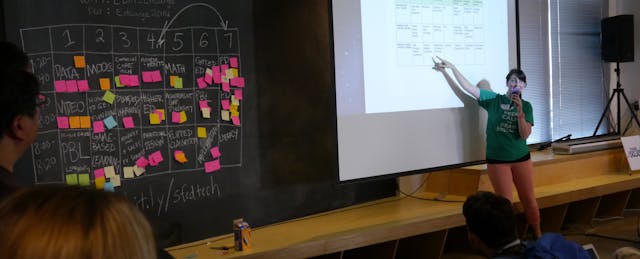Oh, this was fun. On Tuesday night, about 120 educators, entrepreneurs, EdSurgents and Edmodeans gathered in San Mateo, Calif., to share thoughts about where education is headed at our monthly edtech meetup--with a very special twist.
As EdSurgent Mary Jo Madda, pictured above, who edits our Instruct newsletter, pointed out, the event was a quadruple "E": EdSurge's Edtech Edcamp at Edmodo. (Edmodo, a key sponsor for this event, kindly opened up its doors for the meeting--and we all got a glimpse at the spanking new HQ for the social media education company.) Most unusual for this group was the Edcamp structure.
The Edcamp concept has been well-honed by educators. Here's how it works.
Everyone contributes ideas that they'd like to discuss.

The EdSurge team grouped the contributions in 21 categories.

Then everyone gathered in groups to share perspectives, because at an Edcamp, "the power resides in the participants," noted Madda.
PD was a powerful crowd favorite. Because so many people raised questions around professional development, we earmarked two back-to-back sessions just on that topic. Participants included web designers, developers, entrepreneurs, school leaders and teachers.
The entrepreneurs in the group were surprised to find out that educators consider Twitter to be a staple PD tool; the group later drilled into the benefits and limitations of Twitter for PD. "Twitter is really a great conversation starter, but teachers aren't necessarily going to walk away with a whole project," said Miramonte High School Principal, Adam Clark. Another seven-year veteran teacher noted: "One of the things I struggle with is that while there is a lot of breadth on Twitter, there's not so much depth. I feel frustrated when first-year teachers especially use it but are unable to focus on one PD topic and stick with it."
When it came to what makes PD meaningful for teachers, participants were unanimous: teacher choice matters. "The real meat and potatoes of PD comes alive when teachers get to choose...what's your passion and where do you want to be," said one school leader from Envision schools.

Elsewhere in the Edmodo space, participants wrestled with the topic of the challenges of implementing technology, weighing the pro's and con's of a top-down versus bottoms-up strategy. While they clearly identified the benefits of a grassroots strategy, they also pointed to practicalities like ensuring IT could support all the tools teachers wanted to use. In the end, having teachers on your side no matter what the strategy seemed crucial. "There's no way you can implement technology without teacher advocates in the schools," said one school leader from Aspire.
Others shared tips--and frustrations. Teachers and yes, even a few parents, shared tools they liked: among them were Math Kangaroo (a competitive math program); Mahara (for building a web portfolio); Animoto (for creating online videos); SimCity (even, SimCity EDU) for projects, such as learning about a community's sensitivity; and finally Mozilla Popcorn (for adding interactivity to online video). Video game designers talked about whether education can make games that promote "flow," that magical state where challenges match your skills; you are stretched by you're not frustrated. But teachers warned: Games must be integrated into classroom work. Ideally teachers may even want to customize their own content.
Join the conversation by adding comments from a group you attended in the "Add Comment" section below.
Entrepreneur/developer in the making, nine-year old Evan Wang attended, too, with his dad. Evan is researching education and how to improve it. However, he explained, he spent most sessions speaking instead of listening, as participants peppered him with questions about his experience. Not only was he a good sport about answering questions, he said he actually kind of liked it. It's all part of his plans to build software this summer that will support world-class education.
As educator Robert Provonost (@pronovost 4h) wrote: "I feel like the #sfedtech meetup/edcamp right now has been a mini-energizer for #iste14 in a few days. Can't wait!"
Contributors to this piece included: Christina Quattrocchi, Greg Becker, and Pip Duffy. Tweets can be found at #sfedtech.
Special thanks to the event's primary sponsor, Edmodo, and to the other supporters of the SF Edtech Meetups: ClassDojo, Clever, Magoosh, Pearson, and Vocareum. Stay tuned for our next Meetup opportunity, coming up soon! Details will be here.

![Maximizing Tier 1 Instruction: Strategies and Benefits of Effective Scaffolding [Infographic]](https://edsurge.imgix.net/static_assets/blue_green_gradient.jpg?auto=compress%2Cformat&w=360&h=190&fit=crop&blur=200&px=16&mono=E4E6E9)
![Maximizing Tier 1 Instruction: Strategies and Benefits of Effective Scaffolding [Infographic]](https://edsurge.imgix.net/static_assets/blue_green_gradient.jpg?auto=compress%2Cformat&w=190&h=190&fit=crop&blur=200&px=16&mono=E4E6E9)